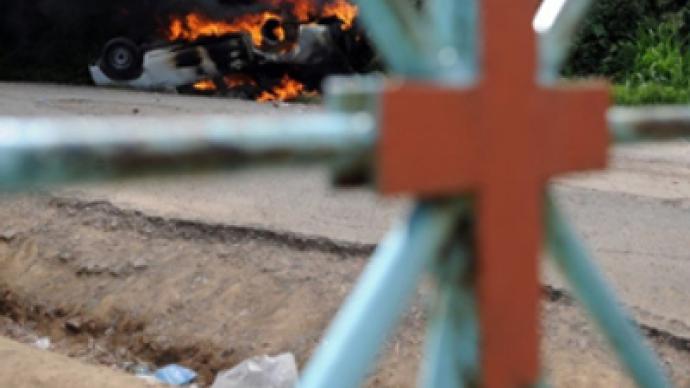Church sides with new Honduran regime

The Honduran Catholic Church — once a natural, national mediator — is at odds with the international community in backing the country’s recent overthrow of President Zelaya.
The Church claims that the unseen hand of Venezuela’s Chavez has shocked it into taking sides.
While the conservative Central American country is split and the international community united in condemning the June 28th ousting of President Zelaya, the Church has made clear its lack of support for the elected liberal president.
“The Catholic Church has lost all ability to mediate. It has lost all credibility,” says Ismael Moreno, a Jesuit priest and radio presenter. If true, this represents a swift fall from grace for the most respected body in Honduras. In times of trouble, the population has traditionally looked to its faith for leadership and guidance.
Interim President Micheletti has shown very public support for the Church. Speaking to Congress in a speech before being sworn in, the former Congressional speaker expressed his gratitude to the Church and army for their roles in the ousting.
The role of the army was clear. On 28th June, under orders from the Supreme Court, it swept up Zelaya in his pajamas and put him on a plane to Costa Rica. Why the Church was thanked in the speech is less clear.
The “coup” that never was
Zelaya’s critics claim he was attempting to change the constitution so he could remain in power. Changes to the constitution are prohibited, making a referendum illegal. Zelaya claims he was organizing a public opinion poll, which is permitted under the constitution.
Church hierarchy figures claim that this was an illegal act. Even Elvin Santos of his own Liberal Party said the move was a path to dictatorship. The stand of the opposition, therefore, was that Zelaya was not the constitutional president when the Army justifiably intervened in his morning routine after a Supreme Court ruling. Therefore, there was no coup.
Cardinal Oscar Rodriguez Maradiaga, head of the Episcopal Conference of Honduras, described talk of a coup as “absurd”. The Cardinal said to the Spanish paper El Mundo: “He (Zelaya) doesn’t have authority, moral or legal.”
The most senior Church figure in Honduras continued: “The legal authority he lost because he broke laws, and the moral authority he lost with a discourse full of lies. The most patriotic thing he could do is stay away.”
Similarly strident statements have been interspersed with other calls for dialogue and reconciliation. It is unclear what the Church saw as the purpose of any negotiations, as its position appears to be fixed.
In an interview with the German daily Die Frankfurter Allgemeine Zeitung, the Cardinal said talks “cannot be to bring about Zelaya’s return to Honduras and his restoration to the President’s office.”
Speaking to the Catholic News agency Zenit, the Cardinal has sought to clarify that the Church is not “taking sides”. Simultaneously, he called Zelaya “dishonest” and accused him of misappropriating development aid.
Church accused of backing the rich
The Church hierarchy stands alongside the parliament, the Supreme Court and the military in not condemning the overthrow. This has led to accusations that the Church has sided with the wealthy Honduran establishment and against the working class, who were the bedrock of Zelaya’s support.
The Church angrily denies these claims, but there is no doubt that Venezuelan leader Hugo Chavez’s perceived influence over Zelaya has angered senior Church figures. The alleged move to change the constitution was seen as one Chavez-like act too many.
Call to keep Chavez at bay
The Cardinal implored Zelaya to stay away, El Mundo quotes him as saying: “Anything else is just trying to impose Hugo Chavez’s project at all costs.”
The Cardinal accused Chavez of fomenting unrest as part of his plan for a Bolivarian revolution in Honduras. “Not a day goes by without my receiving a death threat,” he said in an interview to the German newspaper, blaming Venezuelan secret service agents.
He believes the Church is defending the country’s democratic institutions from outside forces and wonders why the US government is “in perfect harmony with Chavez and his followers”.
Dissenting Church figures silenced
Other rank and file figures in the Honduran Catholic Church are opposed to the new government, but have faced recriminations for their position.
Father Jose Andres Tamayo, who has won awards for his environmental activism, was attacked by soldiers on his way to a pro-Zelaya demonstration. He was with his parishioners when he was forced to go into hiding on 1st July.
The country has seen increased military control. A radio station run by the Catholic order of Jesuits was shut down by soldiers two days after the ousting. Radio Progreso’s Felix Molina said that the military has threatened to shut down any media referring to a “coup d’etat”.
Jonathan Stibbs for RT












